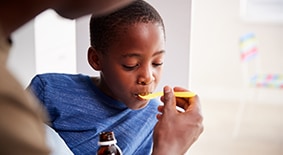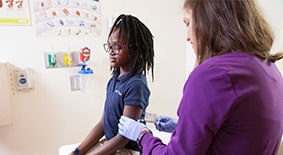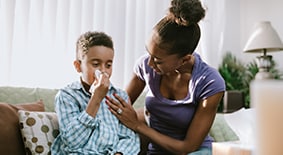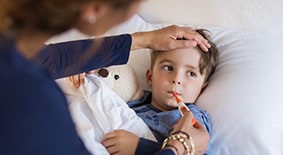Flu, COVID-19, RSV, cold, allergies—what’s the difference?
Because many illness symptoms are similar, it may be difficult for you to decide whether a child has a virus or is experiencing allergies.
When a child starts feeling sick, it’s often a challenge to know which virus is causing their symptoms. Is it a cold virus, a flu virus, RSV or COVID? In some situations, they may not have an infection.
Because cough, congestion and a runny nose could be symptoms of a cold virus, flu virus, RSV or COVID, it is best to keep children with symptoms separate from others.
“It’s important for parents to remember that we often treat infections with any of these viruses the same way—with at-home care that includes fluids, rest and over-the-counter pain or fever reducers, as needed,” says Andi Shane, MD, MPH, MSc, System Medical Director, Infectious Diseases at Children’s Healthcare of Atlanta. “As a parent, it’s important to trust your instincts: call your child’s doctor if you have concerns and feel that your child’s symptoms are concerning,” adds Dr. Shane.
How can I keep the rest of my family well?
If you have sick children, or other family members in your home with any symptoms, try to keep them separate from people without symptoms. Teach children to wash their hands properly and how to use hand sanitizer.

Symptoms of allergies may include:
- Runny nose
- Sniffling
- Sneezing
- Itchy, watery eyes
Colds are caused by an infection of the upper respiratory tract (nose, throat, sinuses and windpipe). Cold viruses are contagious, so they spread easily. Symptoms of a cold usually peak within two to three days and may include:
- Runny or stuffy nose
- Cough
- Sneezing
- Sore throat
- Watery eyes
- Occasional fever
Respiratory syncytial virus (RSV) infection is a viral illness that can cause people to have trouble breathing. It mostly affects young babies and is extremely common—almost all children will have an RSV infection by their second birthday. A child’s first RSV infection is usually the most severe, and children who are born prematurely or have breathing or heart problems are more likely to have complications from an RSV infection. Symptoms of an RSV infection may include:
- Runny nose
- Decreased appetite
- Coughing
- Sneezing
- Fever
- Wheezing
These symptoms usually appear in stages and not all at once. Children infected with RSV usually show symptoms within four to six days after getting infected. In very young infants with RSV, the main symptoms may be irritability, poor feeding, decreased activity and breathing difficulties.
COVID is caused by SARS-CoV-2, a respiratory virus that causes a range of symptoms. Not everyone infected with the virus will have all these symptoms. Some people with COVID become severely ill, others have mild symptoms and still others show no symptoms at all—but all may transmit the SARS-CoV-2 virus to others. Symptoms tend to appear from two to up to 14 days after exposure to the virus, although most people develop symptoms within the first week after exposure. In children, the most common symptoms are fever, congestion and cough.
Symptoms of COVID-19 may include:
- Fever
- Cough
- Sore throat
- Congestion or runny nose
- Shortness of breath or difficulty breathing
- New loss of taste or smell
- Refusal to drink
- Fatigue
- Muscle or body aches
- Headache
Getting a COVID-19 vaccine is the best way to protect everyone from having severe infections. People 6 months of age and older are eligible for a COVID-19 vaccine. COVID-19 vaccines may be given at the same time as a flu vaccine or any other vaccine.
The seasonal flu (influenza) can cause mild to severe illness. Symptoms of the flu usually come on very suddenly; your child may feel perfectly fine one day and feel very sick the next, unlike COVID, which tends to have gradual symptom onset.
Symptoms of the flu may include:
- Fever
- Cough
- Sore throat
- Chills
- Headache
- Runny nose
- Nausea
- Fatigue
- Loss of appetite
Getting a seasonal flu vaccine is the best way to protect everyone from having severe infections or contracting flu. People 6 months of age and older are eligible for a flu vaccine. Some young children may need two flu vaccines during a flu season to be fully protected. Flu vaccines may be given at the same time as a COVID-19 vaccine or any other vaccine.
“It is very, very important for parents to make sure that they and their children receive their flu vaccines each year,” Dr. Shane says. “It’s something parents can actively do to protect children and themselves. In addition, everyone should be and stay up to date on their recommended immunizations."
COVID has many similarities to the flu, since they’re both contagious respiratory viruses. Here are some key differences between the two.
What are the biggest differences between COVID-19 and the flu?
Most children who have the flu experience rapid onset of symptoms and start to feel sick with a fever, cough and runny nose for several days.
In contrast, children with COVID may not have any symptoms or may have a fever for a short period of time, accompanied by congestion, a cough and a sore throat.
What should I do if my child has symptoms?
Seek medical care for your child right away if your child is showing any of these symptoms:
- Trouble breathing
- Pain or pressure in the chest that does not go away
- New confusion
- Inability to wake or stay awake
- Bluish lips or face
- Severe abdominal pain
- Refusing to eat and drink
Helping You Manage Common Childhood Illnesses
Andi L. Shane, MD, MPH, MSc, is Medical Director of Infectious Diseases at Children’s Healthcare of Atlanta. Dr. Shane completed an Epidemic Intelligence Service (EIS) fellowship at the Centers for Disease Control and Prevention (CDC) and a pediatric infectious disease fellowship at the University of California San Francisco. Dr. Shane has broad experience and interests in the field of pediatric infectious diseases and is committed to the care of children with infections with special pathogens in protected care environments working with children’s hospital preparedness teams.
This content is general information and is not specific medical advice. Always consult with a doctor or healthcare provider if you have any questions or concerns about the health of a child. In case of an urgent concern or emergency, call 911 or go to the nearest emergency department right away. Some physicians and affiliated healthcare professionals on the Children’s Healthcare of Atlanta team are independent providers and are not our employees.
Contact Us 404-785-KIDS (5437)









